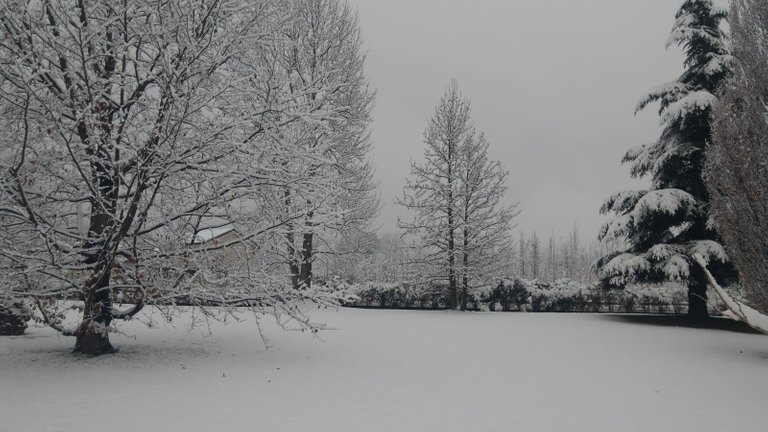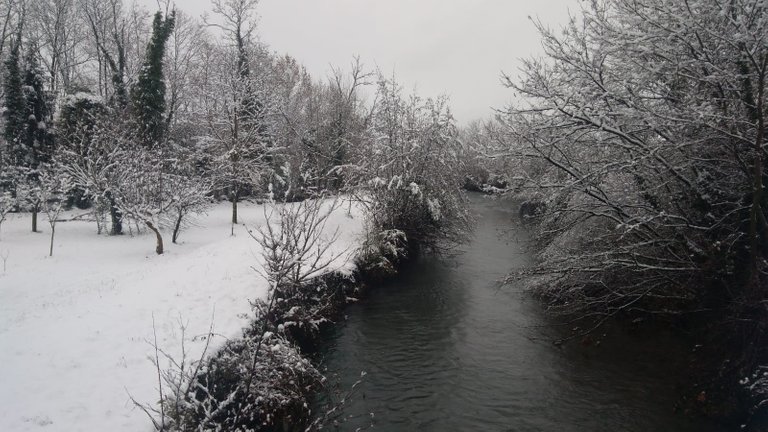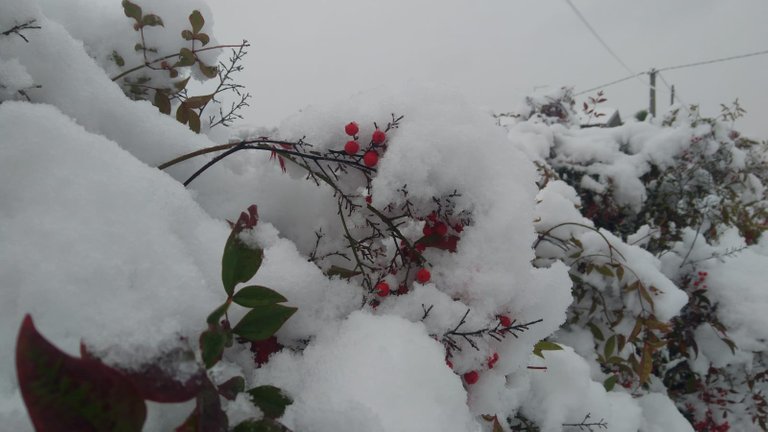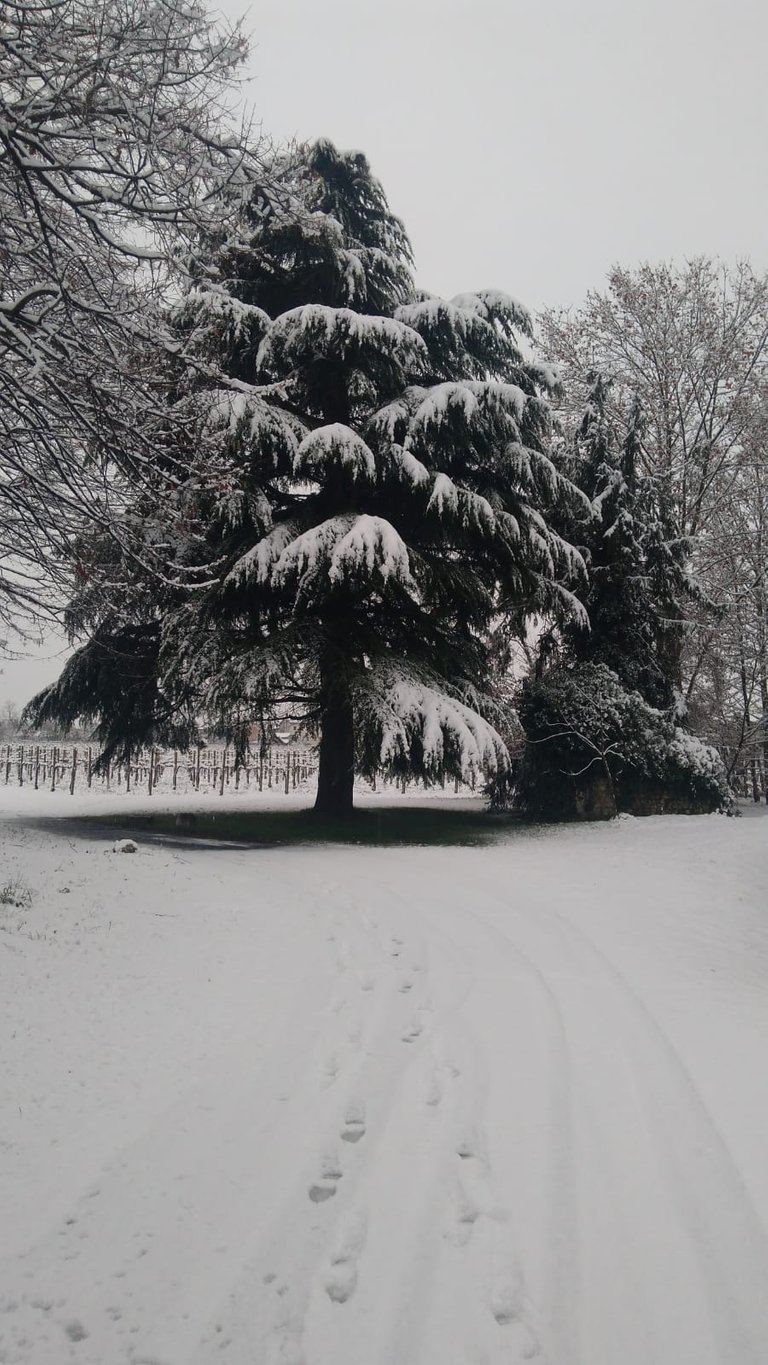
Tomiyasu Fūsei (1885-1979)
[ENG]
The 58th edition of the Mizu no Oto contest arrives with the warmest wishes for a Happy 2021!
The past year has been very difficult for everyone, we hope with all our heart that the slope begins to climb again towards the serenity of the peaks.
With haiku we have always regenerated our spirits and lifted our spirits, so what's better than starting with a good round of Mizu No Oto?
The theme is exquisitely winter, thanks also to the best snowfall around here in recent years (Northeast Italy, ed. Marco).
I decided to put more than one photo, because I couldn't make up my mind. Some show a landscape, others a detail, some can tell a story ... you choose whether to dedicate yourself to one or compose a haiku that encloses the mood of all of them!
Moreover, at the bottom of this post you can read our complete Holiday renga, as already translated by @owasco (with some minor adjustment by me). I think it's a masterpiece!
[ES]
¡Llega la 58 edición del concurso Mizu no Oto con los más cálidos deseos de un Feliz 2021!
El año pasado ha sido muy difícil para todos, esperamos de todo corazón que la pendiente comience a subir nuevamente hacia la serenidad de los picos.
Con el haiku siempre hemos regenerado nuestro espíritu y nos hemos animado, así que ¿qué mejor que empezar con una buena ronda de Mizu No Oto?
El tema es exquisitamente invierno, gracias también a la mejor nevada por aquí en los últimos años (Noreste de Italia, ed. Marco).
Decidí poner más de una foto, porque no podía decidirme. Algunas muestran un paisaje, otras un detalle, algunas pueden contar una historia... ¡tú eliges si te dedicas a uno o compones un haiku que encierra el estado de ánimo de todos!
Además, en la parte inferior de esta publicación puedes leer nuestro Holiday renga

[ENG]
Here is how this contest works: completo, ya traducido por @owasco (con algunos ajustes menores por mí). ¡Creo que es una obra maestra!
A photo is posted.
You write a haiku inspired by that photo with your own post (use #haikucontest as one of your tags) or a comment in the comment section.
You can read other’s haiku and vote for one of them, answering to the special Bananafish comment in the comment section.
The authors of the Best Haiku, Popular Choice, and Best Vote Comment WIN 1 Hive SBI Unit each and they will be mentioned in the proclamation post.
The contest deadline for both posting haiku and voting is 7 days from this post publication. There will be another post with the winners proclamation after 1-2 days from the deadline.
[ES]
Así es como funciona este concurso:
Nosotros publicamos una foto.
Usted escribe un haiku inspirado en esa foto con su propia publicación (use #haikucontest como una de su etiquetas) o un comentario en la sección de comentarios.
Puedes leer el haiku de otros y votar por uno (uno solo) de ellos, respondiendo al comentario especial de Bananafish en la sección de comentarios.
Los autores de Mejor Haiku, Elección Popular y Mejor Comentario de Voto serán premiados con 1 Hive SBI Unit y nombrados en la publicación de proclamación específica.
La fecha límite para enviar su haiku es de siete días a partir de esta publicación. La proclamación será publicada aproximadamente uno o dos días después.

The Prizes/Los Premios:

Los requisitos / The requirements:
• El haiku debe estar relacionado con la imagen del post / The haiku should be related to the prompt image.
• Un haiku no tiene título / A haiku has no title.
• Idiomas permitidos: inglés o español / Allowed languages: English or Spanish.
• La forma del haiku en español que preferimos en este contest es: un verso de 5 sílabas, un verso de 7 sílabas, otro verso de 5 sílabas; se permiten sinalefa y el conteo métrico de las sílabas.
• The English haiku form preferred for this contest is: a short (3-4 syllable) verse, a longer (5-6 syllable) verse, another short (3-4 syllable) verse.
• Debe haber el kireji (切 れ 字), un corte entre los versos primero y segundo, o entre el segundo y el tercero; el corte puede ser gramatical, como un signo de puntuación, o puede ser un corte en el significado, como dos imágenes en contraste / There should be the kireji (切れ字), a cut between the 1st and the 2nd verses, or between the 2nd and the 3rd; the cut can be grammatical, as a sign of punctuation, or it can be a cut in the meaning, like two different images.
• La fecha tope para publicar su haiku y emitir sus votos es hasta el pago de esta publicación / The time window to post your haiku and cast your votes is up to the payout of this post.

Imágenes del prompt / Prompt Images:





Do you want to know how we evaluate the submitted haiku? These are the characteristics we search for / ¿Quieres saber cómo evaluamos el haiku enviado? Estas son las características que buscamos:[all photos by @marcoriccardi]
• Kigo (季語), an explicit or implicit reference to a season, that defines the time of the year in which the haiku is composed or referred to / una referencia explícita o implícita a una temporada, que define la época del año en que se compone o hace referencia al haiku.
• Sabi (寂), the sense of the inexorable passage of time, the beauty or serenity that accompanies the advance of age, when the life of the objects and its impermanence are highlighted by patina and wear or by any visible repairs / el sentido del inexorable paso del tiempo, la belleza o la serenidad que acompañan al avance de la edad, cuando la vida de los objetos y su impermanencia se destacan por la pátina y el desgaste o por cualquier reparación visible.
• Wabi (侘寂), the taste for frugal and natural things, rustic simplicity, freshness or silence; it can be applied to both natural and artificial objects, or even non-ostentatious elegance / el gusto por las cosas frugales y naturales, la sencillez rústica, la frescura o el silencio; puede aplicarse tanto a objetos naturales como artificiales, o incluso a la elegancia no ostentosa.
• Mono no aware (物の哀れ), empathy with nature and human life; the "feeling of things", nostalgia, regret for the passing of time, understanding of the changeability and of the transience without suffering / empatía con la naturaleza y la vida humana; el "sentimiento de las cosas", la nostalgia, el arrepentimiento por el paso del tiempo, la comprensión del cambio y la transitoriedad sin sufrimiento.
• Yūgen (幽玄), sense of wonder and mystery; it represents the state of mind produced by the inexplicable fascination of things, the feeling of an 'other' universe, full of mysterious unity / sentido de maravilla y misterio; representa el estado mental producido por la inexplicable fascinación de las cosas, el sentimiento de un "otro" universo, lleno de misteriosa unidad.
• Karumi (軽み), beauty in simplicity; poetic beauty reflected in its simplicity, free from preconceptions and moral judgment / belleza en simplicidad; La belleza poética se refleja en su simplicidad, libre de preconcepciones y juicios morales.
• Shiori (しおり), gentleness; the levity and the delicate charm that radiates from the verses, where things are evoked in the reader without aggressiveness or excessive explicitness / gentileza; la ligereza y el delicado encanto que irradia de los versos, donde las cosas se evocan en el lector sin agresividad ni excesiva explicación.

El renga de la santidad de la familia
las mascarillas -
en nuestros corazones
luces de fiesta
Lazos fraternos—
gotea la gélida
cuarentena.
paredes se desmoronan
cuando el amor puro llama
ninguna demasiado fuerte o alta
Finura de luz
abrazos enlazados,
vacuna final
Sé responsable.
Vida y luz para todos,
está en tus manos
Acurrucada.
Bien la esperanza enciende hoy
e ilumina más.
Luz entre amigos.
Uno ofrece, otro toma.
Tiempo de fiesta.
Luz para ver
las estrellas amadas.
¡Es Navidad!
Se oyen campanas
en los alrededores...
"Din, don. Din, don."
Suena el mundo
ilumina las almas
Feliz augurio
Manos creyentes
atesoran la Luz.
Nació Jesús.@bananafish: @bertrayo: @owasco: @sacra97: @evagavilan2: @gabmr: @gracielaacevedo: @adncabrera: @salvao: @josemalavem: @mllg:
The renga of the sacredness of the family
masks and snow -
warm colored lights
in our hearts
Human bonds—
defrosting the chasm of
quarantine
walls crumble
when pure love beckons
none too strong or tall
Light finesse
linked hugs,
final vaccine
Be responsible.
Life and light for all,
it's in your hands
Curled up.
Hope ignites well today
and illuminates more.
Light between friends.
One offers, one takes.
Celebration time.
Light to see
the loved stars.
It's Christmas!
Bells are ringing
in the surroundings...
"Ding, dong. Ding, dong."
The world sounds
enlightens souls
Happy omen
Believing hands
treasure the Light.
Jesus was born. @bananafish: @bertrayo: @owasco: @sacra97: @evagavilan2: @gabmr: @gracielaacevedo: @adncabrera: @salvao: @josemalavem: @mllg:

Good haiku to everybody, and remember the posting-voting deadline: seven days from this post publication / Buen haiku para todos, y recuerden la fecha límite de publicación-votación: siete días a partir de esta publicación!

Let’s the Bananafish Tribe grow together!

With delegations, Bananafish voting power will grow and consequently the upvotes given to every contest entry will be higher. An easy mode to delegate some of your HP for a gigantic energy wave is to use PeakD and its wallet.
Following the curation trail is a way to make sure you always support the other participants to the Bananafish contests, automatically upvoting the posts (but not the comments) that Bananafish upvotes. We suggest to join hive.vote to follow curation trails or create yours.
We are also happy if you join the official Hive Bananafish community and publish the posts related to the contest within it, as well as in your blog.
Join the Bananafish Realms on Discord and chat with us: https://discord.gg/ZWmEUWT

[banner credit: @f3nix]
Yes! Another edition of Mizu No Oto to start off the year. Thanks for taking the Renga and showcasing it again. It was a wonderful experience to be part of that poem.
Happy New Year to all haiku lovers and visitors who come to see these pieces of art.
Vote your favorite haiku down here:
Vota tu haiku favorito bajo ahì:
Siempre es difícil elegir el haiku favorito, para mí.
Esta semana se vuelve en cierto sentido un poco más complicado porque hemos partido de imágenes diferentes; pero en otro sentido la presencia del invierno ha hecho confluir los versos alrededor de la sensación de frío (Gélida alfombra: @mllg , Trineo helado: @gabmr, El hielo es una flor:@oacevedo, Luz invernal: @evagavilan2 ) y del color blanco(Senda de nieve: @josemalavem, Cristales blancos: @sacra97, Copos en capas: @luisfe, De blanco y negro: @salvao, Blanca la nieve: @marcybetancourt, blanqueó mi mundo: @carolkean, Blanca estela: @aplausos, Blanco desierto: @bertrayo, Alfombra nívea: @sayuri, Blanco silencio: @gracielaacevedo.
la dura nieve. El miedo nos despierta del hechizo.Mi poema favorito esta semana es el de @salvao porque lo veo capturar el instante con una emocionalidad pragmática: habla, con sencillez y austeridad, quien conoce la crudeza del frío. Nos hace olvidar por un momento el hechizo de la belleza, el romanticismo y la fascinación por lo blanco, para mostrarnos, en 17 silabas, su otro lado:
De blanco y negro
tiñe la vida el frío...
La dura nieve.
Muchas gracias por tu valoración, análisis y bellas palabras. :)
Gracias por la mención.
Muy bueno tu análisis y también doy mi voto a @salvao
Mi voto es para @oacevedo por su original haiku. Logra sin perder las normas un efecto diferente.
Mi haiku favorito es el de @josemalavem
Voto por el haiku de @gracielaacevedo, me encantó. La expresión para cerrar de un blanco silencio trae una terminación del espacio y la soledad en ella.
Termina el año
Es la brisa un cristal.
Alfombra níveaLas fotos invernales de @marcoriccardi han provocado una nevada de espectacular belleza. Aunque la decisión ha sido bastante reñida, voto por el haiku de @sayury:
Voto por el haiku de @gracielaacevedo:
¡Qué bellas vistas!
Contemplar las nevadas,
blanco silencio.
Mi voto para el haiku de @evagavilan2 La palabra luz ilumina ese paisaje. Presentir el río es una imagen que corre fluida siempre. Imposible asirla.
Mi elección: @luisfe
I'm sure any adjustments you made in my translations will be major improvements! I speak no spanish at all and simply popped everything that had not already been translated by the authors into an online translator. Not good for poetry!
Looking forward to participating in this edition. Happy New Year to all our haijin!
It was a pretty good online translator, I changed only a couple of things and I'm not sure I really improved them
I thought your translation work was great. You won my heart 😃
Saludos, amigos. Espero que tengan un año lo más dichoso posible. Ha sido muy bueno conocer el renga completo realizado con el aporte de varios asiduos de este concurso. Les dejo el enlace de mi post y la transcripción de mi ejercico en español.
https://peakd.com/hive-169028/@josemalavem/mi-entrada-a-mizu-no-oto-every-image-has-its-haiku-edition-58
Senda de nieve
el árbol aterido
da su cobijo
Muy bueno, @josemalavem, me gusta. La humanización del árbol. Y el mensaje: tiene frío pero olvida su propìa necesidad para brindar apoyo al otro. Bueno, así me pareció a mí.
Rime IceThanks to @owasco for the nudge and to @bananafish for this fun diversion during a "Driving Hazards" warning almost every day this winter (so far).
frozen fog
whitened my world -
made me look twice
Hielo escarcha
niebla helada
blanqueó mi mundo -
me hizo mirar dos veces
Gracias!Like @owasco, I speak no Spanish. No idea how the translation sounds or if it works at all.
I like that too @carolkean. Great one! I might suggest inverting the second line. "my world---whitened" (that should be an em dash in there; not sure how it will show up in Hive's markdown engine). But either way, very nice!
@bananafish, respectfully I disagree. In Japanese it is common enough to give haiku titles. Sometimes those titles turn into headnotes so long that the headnote and title together almost become a haibun. But that is in Japanese. In English, last I checked the Haiku Society of America didn't advise one way or the other, only commenting that a haiku may or may not have a title
Respectfully, I disagree on you disagreeing. Rarely Japanese haiku do have a title and it's a common thing only in the earlier days of American haiku. Notes aren't titles (as the notes on tanka poetry) and a haibun is a sort of diary page with haiku, a mixture of short prose with poems, since the times of Bashō. I have been studying haiku for 15 years and I don't remember any significant Japanese haijin using titles...anyway, it's only important for the rules of Mizu No Oto contest: if you want to put a title on your haikus you are free to do it, but all participants in our contest are advised that the absence of a title is preferred (i.e. it is a matter of judgment to determine the winner).
haha indeed. In that case I agree to your disagreement on my disagreement. Good call!
Well if we are comparing credentials, I have been studying Japanese literature and poetry, specifically haiku, since university, so 20+ years; I wrote my thesis on Bashō's travel diaries, and I translate them for a living in Japan where I have been living and studying with various haiku groups for 15 years. Whether a short headnote can be considered a title is a matter of semantics. As for significant figures, Takahama Kyoshi used titles (or single word headnotes, if you will) for many of his haiku, and he is about as major as you get for modern times. Santōka had more than a few of what we could call titles. At one time he was overlooked and considered a nobody, but ever since the publication of his complete works, his name has been rising in the haiku world (in Japan, at least).
But at any rate, I'm not arguing. So many people who write haiku just parrot the incorrect info they pick up from books by people who don't even know Japanese (cough... Hass) so sometimes I get caught by various claims more than I should be. But if you have also been studying for awhile and have your own ideas, more power to you. So peace peace 😃
I came across your contest a few times back when I was posting haiku translations and essays more often, but I never really had time to look into it. The past few days I have been dipping my toes back into Hive after a year away and as I followed the "haiku" tag, I saw your post and it was familiar so I clicked in. Now that I am once again dipping my toes back into Hive, I will pay attention more often and maybe enter if I have a chance.
Please feel free to suggest reading and to give directions, because your knowledge is undoubtedly more thorough than mine.
I mainly rely on studies and bibliography from the defunct AIH (Italian Haiku Association), of which I was a member.
In past editions of Mizu no Oto I have written some small and rough articles aimed at beginners - one of them even talked about titles in haiku - however from a mostly classical perspective.
What little I know about the gendai movement comes mostly from Richard Gilbert's studies.
Regarding Takahama Kyoshi, I talked about him in one of the last articles, but unfortunately in unflattering terms, having been associated with the reaction against the period of experimentation that arose from other students of Masaoka Shiki and being associated with the conservative motto kachofuei, which although allowed us to keep the founding principles of haiku up to the present day, was also rather reductive.
However, feel free to intervene and also to participate ... we need both spontaneity and theoretical preparation.
@bananafish - I'll have to go look up your article on Kyoshi after I write this. We would probably agree about him. His haiku are about average, I think. Some bad, some fantastic, most just average. But it is his politics and his ironfisted attempts at control of the haiku world that makes me dislike him.
Gilbert's work on the gender movement are really the best you will find in English. He has done fantastic and amazing work. If you've read his writing, you are ahead of the game.
I am a huge fan of the two shinkeikō students of Ogiwara: Santōka and Hosai. I am currently, in fact, along with a Japanese colleague working on a book of translations and history for both men. Although I of course enjoy Bashō, Buson, and others of the bigger names (and if you look up my past translations on Hive, those names fill most of whom I have translated), it is those two free-verse haiku poets to which I always return.
Are you Italian, then? My father is Sicilian. His father's family was from Sicily for generations and his mother was from Bari.
Thank you @dbooster! Too late, I saw @owasco's warning to me that haikus don't have titles. I had already posted before I noticed that one. Oops.
I love this.
Frozen fog captures both the season and the atmosphere in the photo in three short syllables.
Although the photo at first appears somewhat colorless, the author's use of the word white renders it colorful.
The poem brings both author and reader alive for me, makes me look twice knowing that the author did.
And again, we can see that English versions easily can be written in fewer syllables than Spanish versions, although I don't speak Spanish.
Really great haiku @carolkean, even if you did see fit to use a dang title! lol
The translation works very well, except for the title (btw, a haiku shouldn't have a title): "escarcha" already means "rime ice", no need to add "hielo". Another word you can use for rime ice is "cencellada" 😉
I will comment on your post very soon, now I need some sleep
Thank you! owasco tried to warn me (via Facebook) but I spotted the message too late.
And I forgot to include the monochromatic photo. It's a retired grain bin my dad has emptied, having sold off the last of his grain as he too retires. (Too sad for me to contemplate. No haiku on watching our parents grow old, decline, and ultimately die. #NotThereYet and #NeverWannaGoThere, even in haiku.)
Feliz año nuevo que la calma y la salud nos acompañen a todos. Espectacular volver a leer el renga, asi tenemos el cuadro completo. La fotografias son hermosas estare pendiente para participar es el primero del año.
Happy New Year may calm and health be with us all. Spectacular rereading the renga, so we have the complete picture. The photographs are beautiful. I will be waiting to participate it is the first of the year. @bananafish
Mi participación: https://hive.blog/hive-169028/@sacra97/mizu-no-oto-every-image-has-its-haiku-edition-58-english-espanol
Rojas simientes,
articulan valientes
cristales blancos.
Red seeds,
they articulate brave
white crystals.
Saludos, queridos amantes del haiku.
mi participación
Mi entrada al concurso esQuedé encantada con las hermosas fotos de @marcoriccardi ! Realicé un ejercicio poético en cada una de ellas; los pueden ver en
!Qué bellas vistas!
Contemplar las nevadas,
blanco silencio.
Hermoso haiku @gracielaacevedo. Tienes mi voto. Suerte en el concurso.
Trae tu haiku para acá, no lo has compartido aquí
Termina el año
Es la brisa un cristal.
Alfombra níveaGracias, querida @sayury!
Gracias por la ayuda, corazón. Mi memoria es frágil...jejeje.
Saludos a todos. Voy a comenzar a participar en este concurso pues deseo aprender sobre haiku. Este es mi post:https://hive.blog/hive-169028/@luisfe/mizu-no-oto-every-image-has-its-haiku-edition-58-english-espanol
Silencioso el vaivén.
Duerme la tarde.
Hermoso, es como si el vaivén de las ramas arrullaran ese sueño de la tarde que mencionas. Suerte en el concurso @luisfe
Where did I see a link for posting our favorites?
Not sure how accurate Google translate is, but I like this from @evagavilan2:
The winter light
through the woods.
I feel the river
La luz invernal
a través de los bosques.
Presiento el río
https://hive.blog/hive-169028/@evagavilan2/mizu-no-oto-every-image-has-its-haiku-edition-58-english-espanol
@evagavilan2, la luz ilumina ese paisaje. Presentir el río es una imagen que corre fluida siempre. Imposible asirla.
It's ok like that! There's a comment of mine below, but you can vote your favorite like that, if you prefer ;)
Un venturoso año 2021, les deseo a ustedes, mis compañeros del Mizu No Oto -Every Image Has Its Haiku- reunidos en torno a la comunidad #bananafish. Esta es mi entrada para la ocasión: https://hive.blog/hive-169028/@oacevedo/mizu-no-oto-every-image-has-its-haiku-edition-58-english-espanol
-Todo fluye- Sí.
El hielo es una flor.
-Todo regresa-
-Everything flows- Yes.
Ice is a flower.
-Everything returns-
@oacevedo Este hermoso haiku es muy circular. Gira sobre sí mismo, eterno retorno.
Beautiful! You're clever at breaking the lines - I'd be like,
This is why I rarely take a stab at writing haiku. I feel like I'm tone deaf.
You get it!
Muchas gracias por ofrecer el concurso para iniciar el año, por incluir el renga navideño y por las maravillosas fotografías de invierno.
Espero que el año sea hermoso, a pesar de todo,
Que todo el 2021 traiga salud y felicidad para todos.
¡Ya traigo mi participación!
The pictures that have come in from the cold are more than beautiful !
I want to get lost there !Happy and healthy New Year, dear friends @bananafish!
Muchas gracias por ofrecer el concurso para iniciar el año, por incluir el renga navideño y por las maravillosas fotografías de invierno.
Espero que el año sea hermoso, a pesar de todo,
Que todo el 2021 traiga salud y felicidad para todos.
¡Ya traigo mi participación!
Y aquí mi participación:
https://hive.blog/bananafish/@mllg/mizu-no-oto-every-image-has-its-haiku-edition-58-english-espanol
Hola a todos. Me alegra se comience con buen pie el 2021 en la comunidad de @bananafish.
Mi haiku para esta edición.
Hola a tod@s, aquí les dejo mi participación:
https://peakd.com/hive-148441/@salvao/haiku-para-mizu-no-oto-esp-eng-edition-58
De blanco y negro
tiñe la vida el frío...
La dura nieve.
In black and white
life is coloured by the cold...
The hard snow.
Saludos mi admirado @salvao ..sin duda el blanco de la nieve invernal, no deja matices, va en escala de grises hasta negro, para prepararse para la colorida primavera. Éxito
Gracias! Sin duda la nieve (o un buen temporal) lo impacta todo.
Un feliz año para todos! Sinceramente, la Renga está espectacular!! Qué gran placer ha sido leerle!
Aquí coloco mi participación para esta ronda de Haiku https://hive.blog/hive-169028/@marcybetancourt/mizu-no-oto-every-image-has-its-haiku-edicion-58
Blanca la nieve
frutos rojos colgantes.
Nevada fuerte.
Saludos a todos y muy feliz año nuevo acá mi participación:https://hive.blog/haikucontest/@aplausos/mizu-no-oto-every-image-has-its-haiku-edition-58-english-espanol
These pictures though have melted my heart. Beautiful representations of winter. Here is my haiku:
https://peakd.com/hive-169028/@bertrayo/my-entry-for-mizu-no-oto-every-image-has-its-haiku-edition-58
Comparto mi participación, gracias a @gracielaacevedo que me hizo notar que no lo había hecho.
https://peakd.com/hive-169028/@evagavilan2/mizu-no-oto-every-image-has-its-haiku-edition-58-english-espanol
La luz invernal
a través de los bosques.
Presiento el río
Un feliz año para todos, acá mi participación: https://hive.blog/hive-169028/@petronila/mizu-no-oto-every-image-has-its-haiku-edition-58-english-espanol
Oooops, había olvidado colgar mi haiku acá, gracias @gracielaacevedo, por recordármelo. Mi memoris es frágil. Mi participación: https://hive.blog/hive-169028/@sayury/mizu-no-oto-every-image-has-its-haiku-edition-58-english-espanol
Es la brisa un cristal.
Alfombra nívea